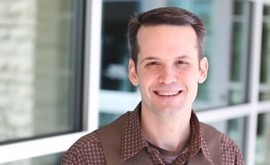Developing Next Generation Leaders
Today, RonnieFloyd.com welcomes guest writer, Dr. Jeff Crawford. Dr. Crawford is the President of Cross Church School of Ministry and a Teaching Pastor at Cross Church.
 I was called to the ministry when I was 14 years old. The year was 1986. Back then, the path to preparation was college and then seminary. I followed the path and I have no regrets. Oklahoma Baptist University, Southwestern Baptist Theological Seminary, and finally, the Southern Baptist Theological Seminary yielded three degrees that have served me like three keys opening multiple doors in the ministry. But this path also was incomplete in terms of a rounded preparation for my calling. My most valuable lessons and skillsets have been learned by doing and by sitting at the feet of great leaders.
I was called to the ministry when I was 14 years old. The year was 1986. Back then, the path to preparation was college and then seminary. I followed the path and I have no regrets. Oklahoma Baptist University, Southwestern Baptist Theological Seminary, and finally, the Southern Baptist Theological Seminary yielded three degrees that have served me like three keys opening multiple doors in the ministry. But this path also was incomplete in terms of a rounded preparation for my calling. My most valuable lessons and skillsets have been learned by doing and by sitting at the feet of great leaders.
In the last 20 years, there has been a shift. I have watched as more and more God-called men and women have deviated from the prescribed “path” and have instead sought the route of pure experience. This devaluing of the formal education process has yielded ministers of great skill, but lacking in theological, biblical, and missiological depth. The result is a shallow ministry practice that fails to serve God’s people.
There must be a better way. There is a better way.
For 26 years, Dr. Ronnie Floyd has led Cross Church, pouring into the lives of next generation leaders. Our common practice has been to seek out the sharpest, young, God-called men and women walking the path of a formal education, and culling them out into internships at Cross Church. This summer is no exception, as 18 of the best next gen leaders are with us during their summer break. We have also been skilled at identifying the sharpest graduates from college and seminary, and bringing them onto our staff team to serve our church while we develop them. In fact, I am a product of the Cross Church system. I served as an intern the summer of 1989 and then after graduating from seminary, served the Cross Church family for nine years through Shiloh Christian School and what was then the Church at Pinnacle Hills. The lessons of leadership and ministry I learned from Cross Church and Dr. Floyd have been invaluable, and coupled with my formal education, have shaped who I am today.
Enter the Cross Church School of Ministry. In just a few short weeks, we will be launching this unique ministry residency program that we believe will change the landscape of ministry preparation and next gen leadership development. Just this last week, I read a fascinating article by Tony Morgan where he recalls a conversation with Dave Travis, the managing director of Leadership Network. In discussing the development of future leaders, Travis explains that, “The question will not be ‘where did they go to school?’ but rather ‘where did they train?’” Dave Travis is correct. This trend is already in full swing. The Cross Church School of Ministry is the next step in the progression of leadership development for the future. We are not saying that the formal path of education is unimportant. To the contrary, we are saying it is critically important – just not all that there is to ministry preparation. The Cross Church School of Ministry capitalizes on the best of both worlds. We have developed partnerships with twelve schools and seminaries. This means that academic institutions are on board and see the value of residency training. The Cross Church School of Ministry also demonstrates a unique commitment to academia, while at the same time, elevating real-time training in ministry through a residency experience.
We are convinced that this will be the model for the future of next generation leadership development. And the result will be that the church and Kingdom are served at a greater and higher level than ever before!
Dr. Jeff Crawford
President, Cross Church School of Ministry and Teaching Pastor
To learn more about the Cross Church School of Ministry, check out our website: www.CrossChurchSchool.com
Intentional Relationship Building
 One of the things I appreciate about Bible Studies for Life is the attention given to relationships inside and outside the local church. If we intend to connect people to small groups for fellowship and spiritual growth, we need to be alert to where such people are. Many are in the large group (the congregation) but are not connected to a small group.
One of the things I appreciate about Bible Studies for Life is the attention given to relationships inside and outside the local church. If we intend to connect people to small groups for fellowship and spiritual growth, we need to be alert to where such people are. Many are in the large group (the congregation) but are not connected to a small group.
Recent statistics from LifeWay Research show the intentionality with which current believers relate to others inside the church. Results of a 2013 survey finds 42% of respondents “agree” they “intentionally spend time with other believers in order to help them to grow in their faith.”
Simply, close to half of believers involved in church are making an effort to help others grow spiritually to some degree. This should not be discounted and should be celebrated.
The other side though, is that 58% of believers could not state that they were involved in intentional growth with other believers. That group is split between people who know they don’t spend time with others for spiritual growth, and those who cannot say for sure whether they do or not. It seems that if you are building relationships on purpose, you would know it!
How Can We Help?
How can we applaud the people already involved while encouraging others to begin participating in helping others grow spiritually?
First, we might realize some are not being intentional in building relationships due to fear or they simply don’t know how. They may not know how to help another person grow. Before jumping to condemnation, we might need a plan to help them.
Second, those who are already helping others grow spiritually can train those who would, but do not have the biblical knowledge. Helping other believers grow does not only mean young Christians just starting on the road of faith; it also means helping older believers take the next step.
Third, pastors and small group leaders can regularly suggest ways to build such relationships. People who have never been intentional may not realize how easy it is to meet someone for breakfast, grab coffee after church, start a men’s prayer group, or even a neighborhood Bible study. A few steps of guidance can reap a bountiful spiritual harvest.
Last, find ways to commend those who are helping others grow, and tell their story. Ask leaders about those making an impact in their groups, then use their stories as “how-to” examples in messages or leader training. Sometimes a real example accomplishes more than verbal instruction will alone.
We all have relationships. But being intentional about building relationships to further the kingdom is something we cannot forget or minimize. How will you be intentional in your relationships today?
Yours for the Great Commission,
Ronnie W. Floyd
Senior Pastor, Cross Church Northwest Arkansas
General Editor, Bible Studies for Life


